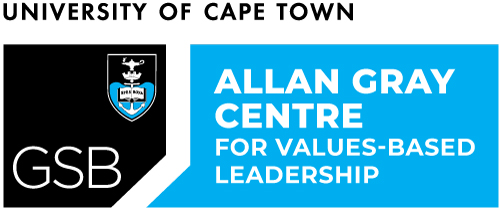ALLAN GRAY CENTRE FOR VALUES-BASED LEADERSHIP
Challenging organisations and individuals with purpose, and resilience
RESEARCH SUPERVISION
The Allan Gray Centre for Values-Based Leadership has an active research programme and its academics supervise international and local PhD theses, MBA dissertations, EMBA dissertations and Master’s degree dissertations. Specialised areas of interest of key faculty include:

PROFESSOR KURT APRIL
- Personal/Individual Leadership: self-mastery; self-awareness; self-efficacy; authenticity; personal character; values; purpose; dimensions of personal choice-making and decisions; judgement/discernment; emotional maturity; forgiveness (self and/or others); kairos/timing; imperfection; personal courage; personal resilience; stewardship; responsible leadership.
- Diversity, Equity & Inclusion (which includes Gender Issues): business case for DE&I; cross-culture; cultural intelligence; all the ways we differ; inclusive environments; psychological effects of exclusion; power; precarity; sexism/racism/homophobia/ageism; guilt and shame; LGBTQIA+; selfish leadership; issues related to women in leadership; mid-life crises; diversability.
- Well-Being: self-care; forgiveness (self- and others); self-compassion; personal boundaries; burnout; suppression – thought suppression/emotional suppression/cognitive suppression; personal spirituality; self-talk (critical self-talk vs. sympathetic self-talk); ageing and issues related to retirement/old-age/ageing; reflective practices (including mindfulness, silence, daydreaming, wandering).
- Identity & Narrative: dialogue; mental models; self-confidence; self-esteem; defining moments; biculturality and mixed identity; paradigms/ideologies; psychosocial transitions; personal meaning orientations.
DR BABAR DHARANI
- Self-Leadership: big five personality traits (openness, conscientiousness, extraversion, agreeableness, and neuroticism); career development (incl. person-job fit, promotions, training, learning and unlearning, self-belief, and skills acquisition); core self-evaluations (locus of control, self-esteem, self-efficacy, and emotional stability); mid-life crises (incl. meaning, values and purpose); narcissism; personas (e.g., work-home interface); stages of psychological development; transference; work stress management.
- Organisation, Department, or Team Leadership: archetypes; group development process (change, transitioning, regression, and evolution); leadership position; person-organisation fit; organisational culture; organisational values and purpose; stimulating behavioural change and effectiveness; team dynamics; trust development; values-based leadership; work motivation.
- Emotions and Well-Being at Work: affect (positive and negative); attitude; anxiety; boredom; depression and burnout; happiness facets (incl. contentment, ecstasy, eudaimonic- and hedonic happiness, subjective well-being); happiness at work constructs (incl. absorption, arousal, organisational commitment, dedication, work engagement, flow, job satisfaction, and vigour).
- Diversity, Equity & Inclusion: atypical leadership; black psychology; business case for DEI; inclusive leadership; inclusive organizational environments; intersectionality; theory development around discrimination (i.e., “-isms” such as accent-ism, age-ism, gender binary-ism, hetero-sex-ism, rac-ism, sex-ism, etc.); women in leadership (incl. defeminization and gender fatigue); white privilege.


DR CAMAREN PETER
Values-based leadership for organisations, particularly in emerging markets.
Leadership, organisations and the fourth industrial revolution: assessing and understanding the implications of the fourth industrial revolution for organisations of the future, with a particular emphasis on emerging markets.
Complexity, organisation and leadership in the 21st century: understanding and acting upon complexity – organisational and external – with a particular emphasis on emerging markets.
Leadership, organisational resilience and behavioural change: understanding and acting to boost organisational resilience and stimulate behavioural change in organisations.
Leadership, organisational crises and resilience: leading organisations through times of crisis, or through organisational crises on the basis of values, especially in emerging markets.
Transdisciplinarity, sustainability and organisations in the 21st century: developing and/or applying transdisciplinary frameworks and approaches towards achieving organisational sustainability.
